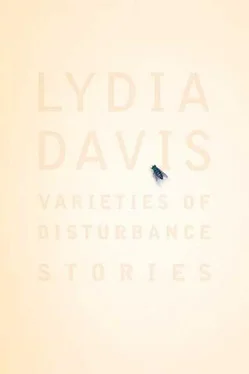Van turning off highway, sun behind, sun around and in window and onto page, does not read.
Van pointing east then north of east motionless, in treeless station not in shadow, sun in face, does not read. †
Van turning, sun ahead, sun around and in opposite window, shadow on page, van pointing south and moving, reads: Longing the so-said mind long lost to longing. Dint of long longing lost to longing. Said is missaid. Whenever said said said missaid. ‡
Van turning off highway, sun behind, sun around and in window and onto page, does not read. *
Van turning last time back onto highway, sun ahead, sun around and in opposite window, shadow on page, reads: No once. No once in pastless now.
Van turning last time off highway, sun ahead, sun around and in window, does not read. †
Van farthest south motionless in shadow, pointing north, reads last words: Said nohow on. ‡
A translator and a critic happened to be together in the great university town of Oxford, having been invited to take part in a conference on translation. The conference occupied all of one Saturday, and that evening they had dinner alone together, though not entirely by choice. Everyone else who had participated in the conference or attended it had departed, even the organizers. Only they had chosen to stay a second night in the rooms provided for them in the college in which the conference had taken place, a down-at-heels building with stained carpets in the hallways, a smell of mildew in the guest rooms, and creaking iron bedsteads.
The restaurant was light and airy, entirely enclosed in glass like a greenhouse. The meal was good and most of the time their conversation was lively. She asked him many questions and he talked a good deal about himself. She knew something about him, since they had corresponded now and then over the years — she had asked his help on one or two points; he had admired an essay of hers; she had praised a reminiscence of his; he had courteously included an excerpt from her latest translation in an anthology. He had a certain almost obsequious charm. He liked talking about himself, and did not ask many questions of her. She noticed the imbalance but did not mind. There was some goodwill between them, though also an underlying tension because of his negative reaction to her translation.
He felt that she kept too close to the original text. He preferred the studied cadences of an earlier version and had said so in person and in print. She felt that he admired lyricism and empty rhetorical flourishes at the expense of accuracy and faithfulness to the style of the original, which was far plainer and clearer, she said, than the flowery and obfuscating earlier version. During the conference, she had given a formal presentation of her approach and he had said nothing in response, though from her lectern she could see by the expression on his face, half amused and half scornful, and by the occasional wince, as he shifted in his seat, that his feelings were strong. For his own presentation he had chosen to discuss the language of translation criticism, including his own, mischievously — or malevolently — taking as his examples the reviews of the translations of the participants in this conference. He had caused almost all of them discomfort and embarrassment, and stung their pride, for only one of them had received no bad reviews.
When they had finished their dinner, it was still light out, since the summer solstice was only a few days away. As the sky would be light for several more hours and they had been shut up in the conference room all day, suffering some tedium at various points and some tension at others, much of it caused by him, and as they were, to some extent, anyway, enjoying each other’s company, they agreed that a walk would be pleasant.
The college where the conference had been held, and the restaurant, which was near it, were a good ten minutes on foot from the center of town, and their plan was to walk into town, stroll up and down the streets a bit, and then walk back out. He had not been there for many years and was curious to see it again. She had explored it on her own for the first time when she arrived the day before, but not very thoroughly or satisfactorily, since it had been crowded with tourists and too hot under the midday sun to be comfortable. She had taken the circular tour bus twice, or rather, she had made two full circuits and one half circuit, going down the main street twice, past the botanical gardens twice, to the outlying colleges twice and in again, and out to the outlying colleges one more time in order to return to where she was staying, and so she was more familiar with the town than he was. By tacit agreement she became the guide. They both felt like the colonials they were, in the mother country, she with one accent displeasing to native ears and he with another that they would not have been able to place.
They talked steadily as they walked into town, still mostly about him, his academic position, his students, his children and how he was bringing them up, and his wife, whom he missed. He and his wife had attempted a separation, but after some weeks she had returned to him. He had, during those weeks, he said, sunk into despair. When there were two of you, you decided so many little things together, such as which room to sit in with your morning coffee. When you were alone, he said, it was so miserably difficult to make those little choices.
The streets were relatively empty, though it was a Saturday night. There were not many tourists, only a few families and couples. The pavements were clear, as though they had been swept clean of the crowds. Now and then, undergraduates in formal evening dress rushed past in a cluster or singly, on the way to a university function. He and she had the curious sense that the town was full of people, but that the people were all attending events behind closed doors and out of sight. The streets were theirs for the moment. The sun hovered low in the sky, hanging above the horizon, descending so slowly that its descent was barely perceptible, and bathing the yellow stones of the old buildings in a honey-colored light. The sky above the rooftops was vast, a pale painted blue.
At the end of a long pedestrian street paved in cobblestones, they heard a full chorus of voices traveling out on the quiet evening air. The concert was taking place in a circular, rose-colored hall. They climbed the steps to a side entrance, thinking they might slip in for the remainder of the concert. He, a cosseted youngest child, was not one to obey regulations, and although she felt in this hour somewhat like a kindly aunt indulging him and his outrageous statements, she was by habit no more law-abiding than he was. Especially here, in the mother country, feeling they were less proper than the native citizens, they would be tempted to behave less properly.
But blocking the entryway were two middle-aged, heavyset women in long skirts and stout-heeled shoes chatting and laughing together, one of whom turned to them and told them civilly but firmly that they could not enter. He and she stood still for some time next to the women, enjoying the rising and falling song while they gazed down into what had been the heart of the original university, a small, centuries-old courtyard fronted by the modest façade of the first university library.
Each of the short neighboring streets, as they continued their walk, offered the surprise of another old college, often with its own gate and spiked fence and courtyard, or some tracery or corbel or bell tower to be admired. Sometimes they both wanted to go up the same street, sometimes only one of them, when the other politely went along. She found it an interesting exercise to explore a place with a person she did not know well, following not only her own impulses but also his.
Читать дальше












